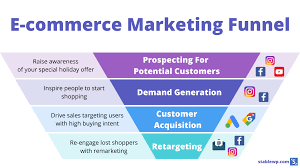The Ultimate Guide to Ecommerce Marketing Strategy
Marketing is a crucial aspect of any ecommerce business. A well-thought-out marketing strategy can help you attract customers, increase sales, and build a strong brand presence online. In this guide, we will explore key strategies that can take your ecommerce marketing efforts to the next level.
Understand Your Target Audience
Before diving into marketing tactics, it’s essential to understand your target audience. Conduct market research to identify their needs, preferences, and behaviours. This information will help you tailor your marketing messages and campaigns effectively.
Optimize Your Website for Conversions
Your ecommerce website is your digital storefront. Ensure it is user-friendly, visually appealing, and optimized for conversions. Implement clear call-to-action buttons, easy navigation, and a seamless checkout process to enhance the shopping experience for your customers.
Leverage Social Media Marketing
Social media platforms are powerful tools for reaching a wide audience and driving traffic to your ecommerce site. Develop a strong social media presence by creating engaging content, running targeted ads, and interacting with your followers to build brand loyalty.
Implement Email Marketing Campaigns
Email marketing remains one of the most effective ways to engage with customers and drive sales. Create personalised email campaigns based on customer behaviour, preferences, and purchase history to nurture relationships and encourage repeat purchases.
Invest in Search Engine Optimization (SEO)
Optimizing your website for search engines can improve its visibility in search results and drive organic traffic. Conduct keyword research, optimize product descriptions and meta tags, and regularly publish quality content to boost your site’s SEO ranking.
Monitor Performance and Analyse Data
Regularly monitor the performance of your marketing campaigns using analytics tools. Track key metrics such as conversion rates, website traffic sources, and customer engagement levels to identify areas for improvement and make data-driven decisions for future strategies.
In conclusion, developing a comprehensive ecommerce marketing strategy requires careful planning, creativity, and continuous refinement. By implementing these key strategies effectively, you can elevate your online presence, attract more customers, and drive sustainable growth for your ecommerce business.
9 Advantages of E-commerce Marketing Strategies: Expanding Reach, Enhancing Engagement, and Boosting Conversion Rates
- 1. Increased reach to a global audience
- 2. Cost-effective compared to traditional marketing channels
- 3. Ability to target specific customer segments with precision
- 4. Real-time tracking and analysis of marketing campaigns
- 5. Enhanced customer engagement through personalised interactions
- 6. Improved brand visibility and recognition online
- 7. Opportunity for seamless integration with social media platforms
- 8. Higher conversion rates through targeted marketing efforts
- 9. Flexibility to adapt strategies quickly based on market trends
Challenges in E-commerce Marketing: Navigating Competition, Costs, and Customer Trust
- High competition
- Costly advertising
- Dependency on technology
- Data privacy concerns
- Customer trust issues
- Return complexities
1. Increased reach to a global audience
One significant advantage of implementing an ecommerce marketing strategy is the increased reach to a global audience. Unlike traditional brick-and-mortar stores, ecommerce platforms have the potential to transcend geographical boundaries and connect with customers worldwide. By leveraging digital marketing channels and strategies, businesses can expand their reach beyond local markets, tapping into new demographics and cultures. This enhanced global visibility not only increases brand awareness but also opens up opportunities for growth and expansion into international markets, ultimately driving sales and revenue on a global scale.
2. Cost-effective compared to traditional marketing channels
One significant advantage of ecommerce marketing strategy is its cost-effectiveness when compared to traditional marketing channels. By leveraging digital platforms and tools, businesses can reach a wider audience at a fraction of the cost associated with traditional marketing methods such as print advertising or TV commercials. Ecommerce marketing allows for targeted campaigns that can be optimised in real-time, ensuring that resources are allocated efficiently to maximise return on investment. This affordability aspect makes ecommerce marketing an attractive option for businesses looking to achieve their marketing goals while staying within budget constraints.
3. Ability to target specific customer segments with precision
One significant advantage of ecommerce marketing strategy is the ability to target specific customer segments with precision. By leveraging data analytics and advanced targeting tools, businesses can tailor their marketing messages and promotions to resonate with specific groups of customers based on demographics, interests, and purchasing behaviour. This level of precision allows for more personalised and relevant communication, increasing the likelihood of engaging potential customers and driving conversions. Ultimately, this targeted approach can lead to higher ROI and better overall performance for ecommerce businesses looking to reach their desired audience effectively.
4. Real-time tracking and analysis of marketing campaigns
One significant advantage of ecommerce marketing strategy is the ability to perform real-time tracking and analysis of marketing campaigns. By leveraging advanced analytics tools, businesses can monitor the performance of their marketing efforts in real time, allowing them to make immediate adjustments based on data insights. This proactive approach enables companies to optimise their campaigns on the fly, identify what works best for their target audience, and allocate resources effectively to maximise ROI. Real-time tracking and analysis empower businesses to stay agile, adapt quickly to market trends, and continuously improve their marketing strategies for enhanced results.
5. Enhanced customer engagement through personalised interactions
Enhanced customer engagement through personalised interactions is a significant advantage of implementing an ecommerce marketing strategy. By tailoring communication and offers to individual customer preferences and behaviours, businesses can create a more personalised and engaging shopping experience. This approach not only fosters stronger relationships with customers but also increases the likelihood of repeat purchases and brand loyalty. Personalisation shows customers that their needs are understood and valued, ultimately leading to higher levels of satisfaction and engagement with the brand.
6. Improved brand visibility and recognition online
Enhancing brand visibility and recognition online is a significant advantage of implementing an ecommerce marketing strategy. By strategically promoting products and engaging with the target audience across various digital channels, businesses can increase their online presence and create a strong brand identity. Consistent branding messages, compelling visuals, and interactive content help to establish brand recognition among consumers, leading to increased trust, loyalty, and ultimately, higher sales conversions. This improved visibility in the competitive online landscape can differentiate a brand from its competitors and solidify its position in the minds of potential customers.
7. Opportunity for seamless integration with social media platforms
One significant advantage of ecommerce marketing strategy is the opportunity for seamless integration with social media platforms. By leveraging the power of social media, businesses can easily connect with their target audience, drive traffic to their online stores, and boost brand visibility. Integrating ecommerce with social media allows for direct interaction with customers, enabling businesses to create engaging content, run targeted ads, and build strong relationships with their followers. This seamless integration enhances the overall shopping experience and opens up new avenues for reaching a wider audience in a more personalised and effective manner.
8. Higher conversion rates through targeted marketing efforts
One significant advantage of ecommerce marketing strategy is the ability to achieve higher conversion rates through targeted marketing efforts. By understanding the specific needs and preferences of your target audience, you can tailor your marketing campaigns to resonate with them effectively. This targeted approach increases the likelihood of converting leads into customers, resulting in improved sales performance and a higher return on investment for your ecommerce business.
9. Flexibility to adapt strategies quickly based on market trends
One significant advantage of ecommerce marketing strategy is the flexibility it offers in adapting strategies swiftly in response to market trends. Unlike traditional marketing methods, ecommerce allows businesses to quickly pivot their strategies based on real-time data and changing market dynamics. This agility enables ecommerce businesses to stay ahead of the competition, capitalise on emerging trends, and effectively meet the evolving needs and preferences of their target audience. By being able to adjust marketing tactics promptly, ecommerce brands can maximise opportunities and maintain a competitive edge in the fast-paced digital landscape.
High competition
In the realm of ecommerce marketing, a significant drawback is the prevalence of high competition. The digital landscape is saturated with numerous competitors all striving to capture the interest of the same target audience. This fierce competition can make it challenging for businesses to stand out and differentiate themselves effectively. With multiple players vying for consumer attention, maintaining visibility and attracting customers requires innovative strategies and a deep understanding of market dynamics to navigate through the crowded online marketplace.
Costly advertising
An inherent drawback of ecommerce marketing strategy is the substantial cost associated with advertising. To run successful marketing campaigns, a considerable budget is often necessary, particularly when investing in paid advertisements on prominent platforms. This financial barrier can pose a challenge for businesses with limited resources, making it difficult to compete effectively in the online marketplace and reach a wide audience without incurring significant expenses.
Dependency on technology
Dependency on technology is a significant drawback of ecommerce marketing strategy. Relying heavily on digital tools and platforms exposes businesses to the risk of technical glitches or sudden changes in algorithms. Any disruption in technology can potentially impact the entire marketing ecosystem, leading to decreased visibility, reduced sales, and customer dissatisfaction. It is essential for ecommerce businesses to have contingency plans in place to mitigate the risks associated with over-reliance on technology in their marketing efforts.
Data privacy concerns
Data privacy concerns pose a significant con in ecommerce marketing strategy. Collecting and storing customer data for marketing purposes can lead to privacy issues and compliance challenges, especially with regulations such as GDPR. Customers are increasingly wary of how their personal information is being used, making it crucial for ecommerce businesses to navigate this delicate balance between data collection for marketing effectiveness and respecting customer privacy rights. Failure to address these concerns adequately can not only result in legal repercussions but also damage the trust and loyalty of customers, ultimately impacting the success of marketing efforts.
Customer trust issues
Customer trust issues can pose a significant challenge for ecommerce businesses. In today’s digital landscape, some consumers may hesitate to share personal information or complete online transactions due to security worries or previous unsatisfactory encounters. Building and maintaining trust with customers is crucial for the success of an ecommerce marketing strategy. Addressing security concerns, providing transparent information about data protection measures, and offering secure payment options are essential steps to reassure hesitant consumers and establish credibility in the online marketplace.
Return complexities
Return complexities are a significant con of ecommerce marketing strategy. Handling returns and refunds in online retail can pose more challenges compared to traditional brick-and-mortar stores. The intricacies involved in managing returns, such as return shipping logistics, restocking inventory, and processing refunds efficiently, can result in customer dissatisfaction and operational hurdles for ecommerce businesses. Balancing customer expectations with the complexities of return processes is crucial to maintain trust and satisfaction among online shoppers.




